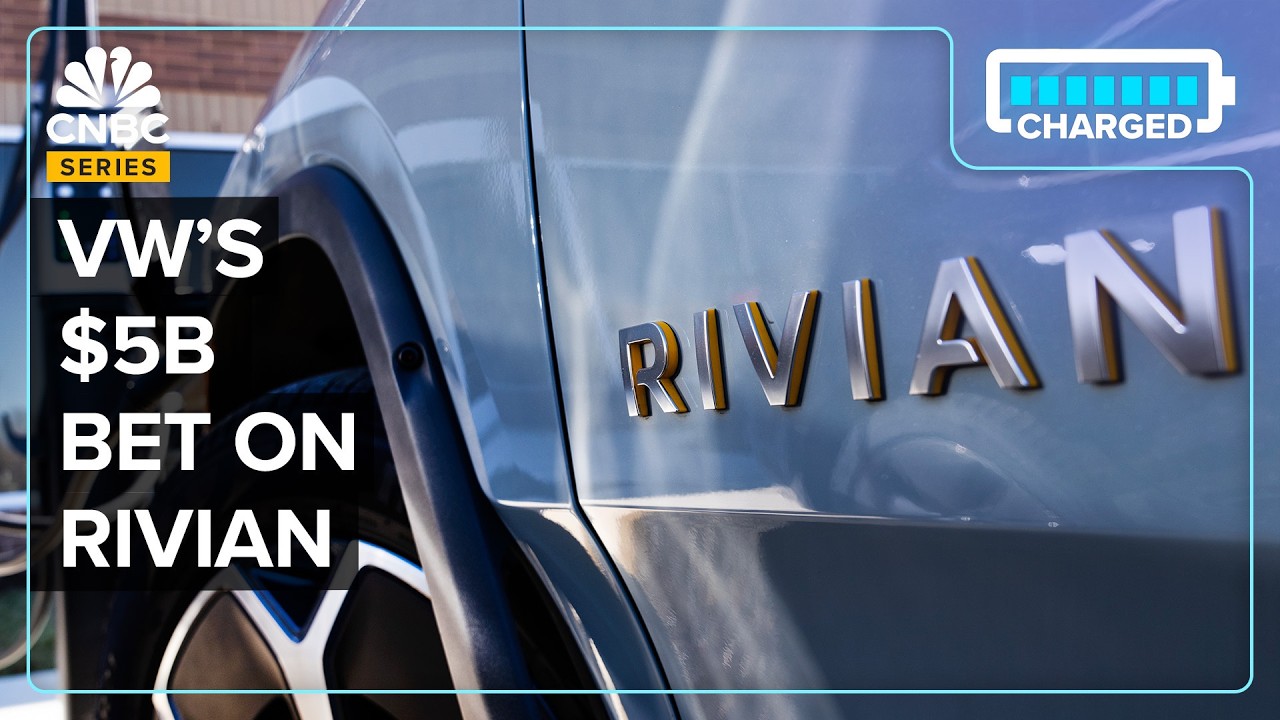Once a much hyped EV startup, Rivian faces a severe
cash crunch. It's losing about $1.5 billion per quarter. Rivian lost between $30,000 and $43,000 on every truck
it sold in the past Five quarters. There are potentially 1 or 2 programs away from
potential bankruptcy. In March 2024, Rivian announced it would pause a plan
to build a $5 billion factory In Georgia. That's where it was supposed to produce
its next generation of vehicles. Then this happened. Rivian announcing, along with Volkswagen, that
Volkswagen will be investing $5 Billion in Rivian. The joint venture which the two companies could
establish as early as fall 2024, could be Rivian's Saving grace, but it's a lot more than that. It's revolutionary for VW. I think that this deal ended up being really
consequential for Volkswagen, but I think maybe even For the industry as a whole. Rivian started out with high hopes it was addressing a
major hole in the EV market. The best selling vehicles in the US are pickup trucks,
and they generate huge profits. Tesla, the biggest EV maker, wasn't producing one
until recently, that is. Rivian. I mean, say what you will about them
financially, but it is a great brand and they Make beautiful products. It's actually the same designer that designed the Jeep
kind of renaissance that happened in the Past couple of decades that went over to Rivian and
made a just a beautiful piece Of art. Rivian also proved it could make commercial trucks,
most notably its fully electric Amazon delivery Vans. Then in 2021, it went public. How much excitement there is around Rivian? We haven't seen this in a long time. Rivian set to IPO this week at a valuation that could
be as high as $65 billion. When I've talked with executives in the auto industry,
all of them say the same thing. This is the IPO to watch. When Rivian IPO'd it was met with a lot of fanfare. That was right after the pandemic when there was a lot
of money chasing a lot of IPOs. But things haven't turned out as planned. Shares have plummeted.
Market cap shrank from $150 billion to about 16
billion by September 2024. I think what happened was people kind of extrapolated
what happened with Tesla, and they kind of Did the same math and they said, well, Rivian's
already ahead of where Tesla was at this point. And it was. But the difference is Tesla when they started were the
only game in Town. You had this EV slowdown happen probably at kind
of the worst possible Time especially you're trying to sell very expensive
vehicles. Interest rates used to be really low when you had all
the excitement. At the end of the second quarter 2020 for Rivian said
it expected to be profitable by the fourth quarter. It still expects to lose $2.7 billion in adjusted
earnings this year. When they went public a couple of years ago, they had,
I think, almost $19 billion in cash, and they've burned Through probably about 75% of that at this point,
which is not great because they've Been spending a lot of money on both on R&D, on new
products, as well as the money They started spending on building a second factory. But their volumes were not enough to sustain that
spend rate. And the vehicles that they were building already were
costing way more than they could charge for them. That's for the VW deal comes in handy. Apart from the much needed cash, Rivian also gets the
benefit of partnering with an established automaker. Rivian is a drop in the bucket, right? Like if their wildest dreams come true, they're going
to be selling 200 plus thousand units out of that Factory in Illinois. They are way down on the totem pole in terms of
getting favorable pricing from all of these different Individual suppliers. Volkswagen sells about 9 million vehicles around the
world per year. If you call those people up and you have Volkswagen
standing behind you saying this is a Multi million unit order, then that person picks the
phone up and they give you favorable Pricing, much more favorable pricing than what Rivian
would be getting solo. So if Volkswagen offers Rivian cash and bargaining
clout, what is Rivian's offer? Despite its troubles, the way Rivian and, companies
like it, design and build cars is Fundamentally different from the way nearly every
legacy automaker does. It comes down to three words software defined vehicle. Volkswagen tried to really get into the software
defined vehicle space had a very difficult time doing It.
Basically, as the name suggests, it is one that is more
or less controlled through software, and this is key Software that can be updated throughout the life of
the vehicle. Tesla pioneered this. It can diagnose problems on its cars, fix them, and
even add new features all remotely Without having to touch the car. Famously, in 2018, the Tesla model three received a
low rating from Consumer Reports because it took an Extremely long time to bring the vehicle to a complete
stop. That's a serious safety concern. The company fixed the problem with the remote update
and secured the group's recommendation. Auto industry analysts, including Consumer Reports'
testing director, had never seen Anything like that before. To that end, to compete in this new world, VW founded
a software subsidiary in 2020 known as Cariad. It stands for car, I am digital. Like a lot of other automakers, they intended to do
most of their software in-house. Well at Volkswagen, like many other companies that
turned into a major Disaster. Software problems delayed several product launches from
multiple brands, including highly profitable ones such As Porsche and Audi. And more importantly, it's been a costly initiative. CARIAD reported €2.4 billion and €2.1 billion
operating losses in 2023 and 2022, respectively. The struggles led to a management shakeup at VW Group,
affecting even CEO Herbert Diess. That is what ultimately part of what led to Mr. Diess having to leave the company. And now what they did was they took the Porsche brand
leader, Oliver Blume, and now he's the co-CEO of both Porsche
brand and the Volkswagen Group. I'm sure he's a very dynamic guy and a great
leader, but he's probably has A lot of plates to balance, right? There's spinning. And now to have to think about
software in house. Since its launch troubles, Porsche said it would expand
its relationship with Google for infotainment software. Vw overhauled CARIAD's leadership in 2023, appointing
a new CEO and board members, Along with a new chief software officer from.. Quess where?
Rivian. He's also ex Tesla. All these troubles are despite the fact that VW, like
every other legacy automaker, has been putting Software in cars since long before Tesla or Rivian
existed. The first computer chip on a car was designed to
regulate spark plug timing to save fuel on a 1977 Oldsmobile Toronado made by General Motors. But the way legacy automakers have integrated hardware
and software for decades doesn't meet the needs of the Moment, upending the old ways has proven far more
difficult for them than for the lean, nimble new Companies established in the digital age. They say, how come Tesla's not having this problem,
right? How come the Chinese aren't having this problem? How come Rivian is not having this problem? One thing leads to another, and then they realize it's
because the underlying architecture of how their Vehicles are built are just so different. We can't change. We have to either change which is
super difficult, or try to Piggyback off the work that companies like Rivian are
doing. They can stay laser focused and they can sort of, you
know, play in a different space of new technology Where Volkswagen has to play and say, we got bills
every single month. We got to pay. Rivian is losing 38,000. I forget what the number is, what, $35,000 per car. And they're doing a victory lap because they're not
losing $40,000 per car. Volkswagen can't say that. They can't say, oh, give us some time, shareholder. We're only losing $40,000 per car. But they can play by a different script. This is the insanity of this industry. The automakers we know VW, Ford, GM, Toyota, BMW,
Hyundai and even Tesla Rely on suppliers to provide them with parts since the
days of the 77 Toronado. More and more pieces of the car have become embedded
with chips and software. But one at a time. They wanted to add electronic stability control or
massaging seats to to a vehicle. They would go to their suppliers and say, okay, here's
the feature we want to add. Or suppliers might develop something that the
automakers hadn't thought of and bring it to the Automaker and say, hey, here's our new feature we
developed. And so then the automakers will take a look at that
and say, okay, we're going to buy
This feature. So the automaker gets a set of components, sensors,
actuators, and what is basically a little computer Called an electronic control unit or ECU. The automaker just fits that into its vehicle. But the software on that computer is isolated to that
one little device. It is written by the supplier, it isn't connected to
the internet, and it doesn't talk to any of the other Systems on the vehicle. Now picture there is somewhere between 70 and 100 of
these ECUs in a single car. All of them have their own software, their own
requirements. Automating a simple task like engaging a driver's
profile with their preferred seat. Climate and entertainment settings could involve
dozens of different ECUs. From the very beginning of Rivian, we said we need to
own the electronics in the vehicle that Allows us to own the way we think about the network
architecture and that, importantly, allows us to own Not just the software stack, but allows us to own how
the hardware within the vehicle evolves. You don't have dozens and dozens of black boxes with
static code written by somebody else. Instead, you have one centralized platform that houses
all of the Code that you yourself wrote, and the only way you can
do that is if You are the one dictating what the underlying hardware
looks like. Instead of 70 to 100 different computers throughout the
vehicle, Rivian's first generation vehicles had just 17. In their second generation, they reduced that
number to seven. That wouldn't have been possible in the time that we
did it. If we had to coordinate across 50 or 60 different ECUs
across a variety of tier one Suppliers. Rivian like Tesla and basically every smartphone maker
is able to tweak software and hardware Independently by making use of a layer called
middleware. It can send updates to the vehicle's software without
changing out all the hardware, or vice versa. That middleware layer is essential to a software
defined vehicle. And that's where everybody's having a lot of
challenges. Rivian has added more than 500 features through over 30
over-the-air updates in the previous two and a half Years. Even more importantly, what this deal does is it
validates that New philosophy regarding what it is an automaker needs
to have control Of in house. So it's a really consequential agreement.
So Volkswagen gets access to software and Rivian gets
needed cash in a far larger, stable partner Because its software and hardware will be going into
Volkswagen vehicles. Rivian now also has access to a far larger potential
pool of vehicles from which it can collect Data. Rivian's success in software, hardware and
network architecture do beg some in the industry to Wonder why bother making cars at all? It is very difficult to make a car. You're heavily scrutinized. You have a a product that can has a liability side of
it because it's moving people at high Speeds. You have this idea of organizing supply bases,
and you're trying to get all your material costs and Everything going down. Logistically, if you're on the
software side, you get to do that and you can be brand Agnostic. You don't have to sell it to only your be on
your product. You can sell it to many manufacturers out there. After all, Rivian's current financial challenges mostly
result from the capital expenditures needed to bring Vehicles to market. To add to that, Volkswagen also plans to resurrect the
old American Scout brand as a line of all electric SUVs. For all its success with highly profitable and
prestigious brands – Audi, Porsche, Lamborghini, Bentley – Volkswagen has never been able
to sustain a presence in the US truck and large SUV Markets. These vehicles would be direct competitors to
the models Rivian currently sells. And I got no proof on this one. But the idea here is one of the strategies could be,
does Volkswagen want to buy up Rivian and become a Subset of Volkswagen? Does Rivian want to be in the car making business at
all in the future? I think what's happening is Volkswagen is looking at
the Rivian equity investment as a hedge. You know, in case a scout endeavor is not successful. You know, one of the toughest market, perhaps in the
world to try to penetrate and compete in is the US. And I think Volkswagen has tried doing this in the
past. We've seen Japanese brands try to do trucks in the US. Some of them have succeeded, but for the most part
they're dominated right by the D three. So it's an open question of whether or not Scout would
be successful. But first, this collaboration has to succeed. I don't know if this approach will ultimately work
right There is a long list Of failed automotive partnerships between OEMs. Other automakers are, for now, pursuing the path VW
seems to be abandoning. Some are familiar to Americans, such as Ford.
Their conclusion is that if you believe this is the
right path forward and it's so core, then you have to Do it yourself. Others are the up and comers. Much of the industry is worried about. The Chinese, somehow, some way, they figured out how
to build Software defined electric vehicles with a 30 plus
percent cost advantage Versus the rest of the world. And it's not because they called up some white knight
tier one supplier to get you to do all the cool stuff On their behalf, right? They figured it out. VW and Rivian declined CNBC's request for an interview
or comment.





